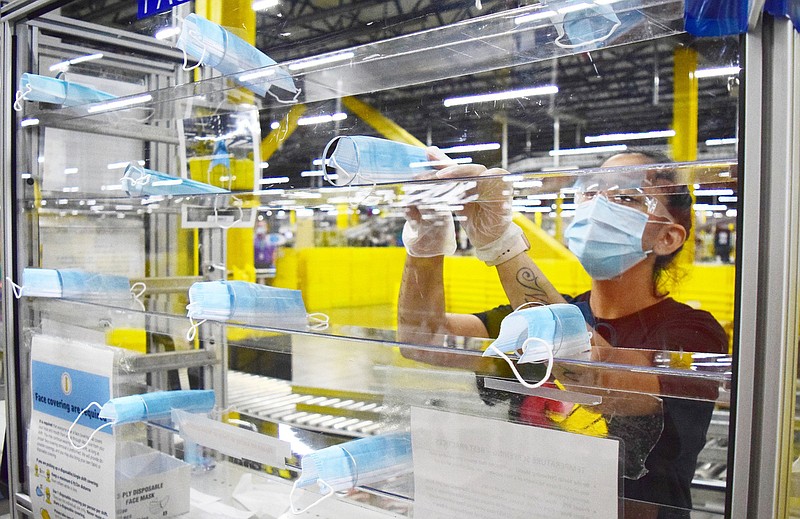Even in America, the "land of the free," government can require that citizens wear face masks to help curb the spread of the coronavirus - a move many states and local governments are considering as new COVID-19 cases continue to swell in areas across the country.
Zack Buck, an associate professor at the University of Tennessee College of Law, said even though the U.S. Constitution is the supreme law of the land, states have broad authority to intervene and issue mandates in certain circumstances such as public health emergencies.
"It's a steep hill to climb for someone to challenge that," Buck said, adding that courts have frequently upheld rules that limit constitutional rights as long as they're limited in scope.
"Even if it were found that someone had a constitutional right to be free of masks, the state can still reasonably restrict constitutional rights in the name of safety," he said.
Examples include laws that require seat belt use in vehicles and prohibit smoking in public spaces.
Buck said that "you'd have to have evidence that wearing a mask causes something uniquely harmful to you" in order to have a case against a face mask ordinance.
That's why many of the mask ordinances that currently exist include exemptions for young children and people for whom wearing a face mask might pose a safety hazard.
As the pandemic has intensified, particularly in freedom-loving red states like Tennessee, the issue of government interference in people's day-to-day decisions has popped up on social media and elsewhere.
"Well actually, the Government isn't the boss of me," reader Alex Falbey posted in a Facebook comment on a Times Free Press story. "Soooo."
Others are more supportive of public health efforts.
"Chattanoogans grow up and wear a mask," Pam Johnston commented. "It is for others not yourselves and so much better than a ventilator!"
Dr. Ellen Wright Clayton, a physician and lawyer who teaches bioethics, law and public health at Vanderbilt University Medical Center, said "there is no question this is constitutionally permissible" for a state to require face masks, and states have an obligation to protect the health of the public.
"We are facing a gigantic health crisis here and the point of wearing a face mask is to protect other people, and we hope it helps protect the individual, but we know for sure that wearing face masks will help decrease transmission," Clayton said. "Many people are going to die if we don't use masks. This measure is critical, and in many other parts of the country, people are doing it."
Clayton said some states require people to wear masks whenever they're outside of their homes.
"Tennessee isn't even thinking about that. They're talking about doing it if you can't socially distance and in a variety of other settings. Policymakers are working to figure out workable solutions," she said.
In Tennessee, Gov. Bill Lee has repeatedly said his health department sets such rules for the state's 89 smallest counties, which lack a freestanding health department. The six largest counties, including Hamilton, have their own health departments that are free to set public health policy including business closures and reopenings and other COVID-19 safety measures. Hamilton County Mayor Jim Coppinger has chosen to defer to Lee's policy directives.
Although Lee says masks are one of the most important tools needed to combat the coronavirus, the governor so far has opted not to require them statewide.
Shelby County was the first to step out and pass a mandate last month, followed by Davidson County, which began requiring face coverings this week. Coppinger said this week that he's considering a mask ordinance.
During a news conference Wednesday, Lee said that while densely populated urban areas continued to have the highest rates of COVID-19, he's also concerned about the growing number of cases in rural counties.
"Local governments in other areas are also asking for ways to create stronger expectations around wearing masks, and we are exploring the most effective way to make this possible," he said. "We will have a resolution on that question hopefully very soon."
In Alabama, Gov. Kay Ivey said she will not issue a statewide face mask requirement, but several counties and municipalities have done so.
Montgomery Mayor Steven Reed in June issued an executive order requiring face masks, and the health officer of Jefferson County - which encompasses Birmingham - issued an order requiring masks starting this week, as did Tuscaloosa on Wednesday.
Savannah on Tuesday became the first major city in Georgia to require the use of masks, "setting up a potential showdown with Gov. Brian Kemp over whether local officials can take more sweeping steps than the state to contain the coronavirus," according to The Atlanta Journal Constitution. Violators will be offered a face covering before they are cited, and fined $500 if they refuse to comply.
Contact Elizabeth Fite at efite@timesfreepress.com or follow her on Twitter @ecfite.
